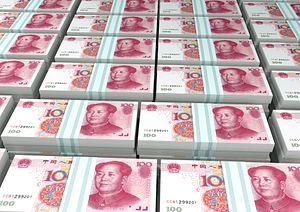Ever since the People’s Bank of China announced on August 11 that it was going to depreciate the renminbi (RMB) in a “one-off” move, the global financial community has been scrambling to figure out how to interpret the decision. China’s state media released a wave of commentaries trying to reassure financial analysts that all is well in the country’s economy. That didn’t work – especially as the RMB’s value continued to drop, dipping to a four-year low on Wednesday. In two days, the RMB had dropped 3.5 percent against the dollar.
To stem growing anxiety, China’s central bank made the unusual move of hosting a press conference in Beijing to explain the decision. Speaking to journalists, Zhang Xiaohui, assistant governor of the PBOC, said that the RMB should stay strong in the long run, according to Xinhua. She said that the currency devaluation was not designed to prop up China’s economy, but rather a move to bring the RMB’s value in line with market forces.
Because the RMB’s value is anchored to the U.S. dollar (though its value relative to the dollar is allowed to ‘float’ by up to 2 percent each day), its value had been artificially inflated as the dollar gained strength. In February 2015, Barclay’s listed the RMB as the world’s second-most overvalued currency, and predicted a drop in its value.
The devaluation on Tuesday was the result of a PBOC adjustment to the exchange rate formation mechanism, with the end goal of bringing the RMB’s value more in line with the market, Zhang explained. Prior to the change, the central parity rates for the RMB had drifted away from the actual market rate “by a large extent and for a long duration,” she said.
Zhang also insisted that the currency as a whole remains strong, citing China’s “7 percent growth rate… increasing demand for the currency from overseas companies, abundant foreign exchange reserves, stable fiscal condition, and a healthy financial system” as factors keeping the RMB steady. Zhang told reporters that the adjustment to the RMB’s value was “basically complete,” in Xinhua’s words.
Previously, Reuters had cited unnamed Chinese government sources as saying that “powerful voices within [the] government were pushing for the yuan to go still lower, suggesting pressure for an overall devaluation of almost 10 percent.”
Yi Gang, deputy governor of the PBOC, directly refuted that report, calling it “completely baseless.” PBOC “no longer regularly intervenes in the exchange rate but will continue to manage it, especially when volatility exceeds a tolerable range, to let market forces decide the yuan’s valuation,” Yi said.
Chinese media also sought to reassure the world that China was not seeking to devalue its currency to give an artificial boost to its exports. “China has not devaluated its currency on purpose to benefit its exporters at the expense of overseas competitors. The lower exchange rate is just a byproduct, not a goal,” a Xinhua commentary argued. The same piece argued against called the move a devaluation at all: “the exchange rate formation mechanism reform neither simply equals currency devaluation, nor means a devaluation trend of the RMB.”
Analysts have long urged China to give market forces a greater role in determining the value of the RMB. in this instance, doing so also provides a boost to China’s exporters, making it an easier call for leadership. The real question is whether China can give up its addiction to government intervention when the RMB’s value becomes an economic issue.

































